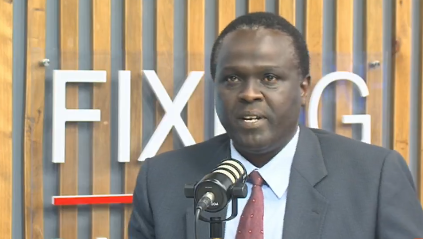 Nacada Deputy Director for Planning and Performance Management, Kirwa Lelei, speaking during the interview on July 17, 2025/SCREENGRAB
Nacada Deputy Director for Planning and Performance Management, Kirwa Lelei, speaking during the interview on July 17, 2025/SCREENGRABThe government proposed to raise Kenya’s legal drinking age from 18 to 21 to tackle rising alcohol consumption among youth, a move National Authority for the Campaign Against Alcohol and Drug Abuse (Nacada) says is backed by science, statistics and growing public concern.
Speaking during an interview with NTV's Fixing the Nation on Thursday, Nacada Deputy Director for Planning and Performance Management, Kirwa Lelei, said the decision stems from data showing worrying trends among underage drinkers, particularly in learning institutions.
“Medically, psychologists and psychiatrists agree that brain development continues until age 25,” Lelei said.
“Starting alcohol consumption at 18 significantly increases the risk of developing dependency later in life. Raising the legal age to 21 is a protective buffer.”
The proposal is anchored in the 2025 National Policy on Alcohol, Drugs and Substance Abuse, approved by the Cabinet.
It forms part of a broader policy shift that seeks to limit youth access to alcohol and create safer environments through reforms in regulation, distribution and public education.
Among other measures in the policy included banning home alcohol deliveries, restricting outlets from operating within 300 metres of schools, churches and homes and assigning Nacada a central role in enforcement alongside county governments.
According to Lelei, data from Nacada studies paint a stark picture.
The prevalence of consumption of alcohol among primary school pupils stands at 2.6 per cent, rising to 3.8 per cent in secondary schools and up to 18 per cent in universities, which is above the national average of 11.2 per cent.
University students, Lelei said, are particularly vulnerable.
“In universities alone, recent research shows that between 15,000 to 16,000 students are already battling alcohol use disorder,” he noted.
“Many of them began drinking before they turned 21. These are young people whose academic and mental health outcomes are now at risk.”
Lelei added that early alcohol exposure is being driven by peer pressure and ease of access.
A large proportion of secondary school students reported first accessing alcohol at home, a trend the new restrictions aim to curb.
“Accessibility is a major issue,” he said.
“That’s why we’re enforcing zoning regulations, restricting sales near residential areas and schools. We also want to close loopholes created by online platforms that allow minors to order alcohol from their phones.”
While some critics argue that raising the drinking age could drive youth towards illegal or counterfeit alcohol, Lelei cited global evidence showing long-term public health benefits in countries that implemented similar laws.
 Alcohol/HANDOUT
Alcohol/HANDOUT“In Japan, hospital admissions for alcohol-related illnesses dropped by nearly 20 per cent. South Africa is considering a similar move due to rising alcohol-related crime.”
The Kenyan context, he said, calls for equally bold decisions.
“We are not imposing this policy; we are inviting a national conversation. The aim is not to punish but to protect our future generation," he said.
The proposal is not just about age, but also about shifting societal attitudes.
Nacada launched a “Positive Parenting” campaign to involve families in preventing underage drinking. Lelei stressed the importance of civic education and collective responsibility in complementing legal reforms.
“Any policy will have supporters and critics,” he said.
“But we must ask ourselves: what kind of future are we securing for our young people? If we truly care, we will act, not later, but now.”
Even as enforcement challenges are acknowledged, the new policy’s strength lies in its comprehensive approach. Beyond the age increase, it introduces measures to dismantle marketing tactics targeting youth, including banning celebrity endorsements of alcohol brands.
Lelei said the policy has already drawn strong support from stakeholders consulted across the counties.
“This proposal came from the people. Communities, leaders, and even medical experts told us the current legal age of 18 isn’t working. We listened and the Cabinet agreed with our findings.”
With implementation set to begin, Nacada is preparing for public engagement campaigns to explain the rationale and benefits of the new policy.
The agency is also calling on counties to strengthen their licensing and inspection roles to support the reforms.
“This is a defining moment for the country,” Lelei said.
“We are not just changing a number, we are making a statement that our youth matter and that their health and future are worth protecting.”
If passed into law, Kenya will join a growing number of
countries reconsidering minimum drinking age laws amid rising youth
vulnerability to substance abuse.











